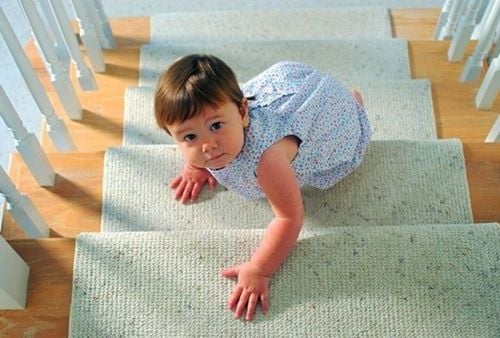This is an automatically translated article.
At 15 months, babies begin to become more obedient and more confident in walking and other independent movements. However, parents will also find a child's development tends to slow down. Therefore, early recognition of how much a 15-month-old baby weighs as well as determining whether the child is malnourished or not in order to promptly adjust.
1. Physical development milestones of 15-month-old children
Since every child is unique, the timing of a 15-month-old's physical development milestones and how they reach their weight or height index can vary between toddlers. Remember that every child grows at his or her own pace and be patient if some milestones are reached a little later than others.
Here are a few examples of some of the milestones parents may see with their 15-month-old this month:
During this second year of life, your baby's growth rate may be slower than it was at 12 months firstly. A child's height and weight increase at a slower and steady rate, and head circumference growth may also slow during this time. Parents, pediatricians or child care teachers will continue to monitor their child's growth at regular visits using familiar growth charts from previous visits.
Accordingly, the average weight of a 15-month-old baby is 10.4 kg (23 pounds) for girls and 11.1 kg (24.5 pounds) for boys. Therefore, a 15-month-old baby weighing 8kg or an 8-month-old baby weighing 8.5kg is considered severely malnourished. However, there are many factors that greatly influence a child's weight in the first years of life, for example, low birth weight, premature birth, birth defects or diseases, repeated infections, etc. . then it will be difficult to reach the standard weight. Even so, if the children's growth in these cases still forms a positive curve on the weight-height chart, it is not a cause for concern. On the contrary, if the child is observed that the child's growth is poor compared to the previous month, parents need to take the child to see a pediatrician early for proper intervention. The most common cause is the child's unsuitable diet. Since this is the transition period to solid foods, not providing enough nutrients in a child's meals can lead to malnutrition.
2. Other physical development of 15-month-old children
Climbing: If your child has mastered walking on his own, he or she may be ready for a new challenge — climbing stairs. Climbing is the first stage of this process and children will be eager to practice by watching adults. After that, going down stairs will be more difficult, so children need parents' guidance on how to position their bodies to do this safely.
Observe how things work around you: As children become familiar with the world around them, they will begin to understand how certain objects work, an important step in cognitive development. For example, children may imitate adults using a comb to brush their hair, stroke their hair, or hold a phone close to their face.
Language skills: 15 months old is when babies learn to speak. This is a period of leaps and bounds in language development and vocabulary growth. Around this time, when children begin to grasp language, they can build their own vocabulary. Therefore, this is an ideal time for parents to help their children learn vocabulary in everyday life by reinforcing correct pronunciation and constant correction. A child's language skills will improve over time with the help of parents and adults around. On the contrary, the lack of adult attention will make the child speechless or slow to speak.

Bé 15 tháng nặng 8kg phát triển kèm theo một số hoạt động thể chất
3. How to take care of a 15-month-old baby
Three small meals and two snacks in between is a good nutrition for toddlers. However, don't worry if your child insists on eating everything in sight one day while refusing certain foods or even meals the next day. These differences in appetite may be a natural result of things like changes in activity levels, changes in metabolism, and growth spurts.
Moreover, parents also do not worry if the child does not want to eat the food you have prepared for the child. For example, if your child doesn't want his lunch yet, save it for later when he can change his mind and enjoy eating.
To make sure your child gets all the nutrients he or she needs, offer a variety of healthy foods at each meal, including:
Protein foods like meat, fish, poultry and eggs Dairy products such as cow's milk and yogurt Fruits and vegetables Grains and starches such as cereals, bread, pasta, potatoes and rice. Remember, even though your child may not eat a wide variety of nutritious foods on a particular day, in a few days his or her diet will be overall balanced and he will be getting the nutrients he needs. necessary for growth and health, and prevention of malnutrition.
4. Sleeping time of a 15-month-old baby
Sleep is very important for the health and optimal growth of children in terms of weight and height. By 15 months, babies need about 12 to 14 hours of sleep a day, including 1 or 2 daytime naps. To help ensure that your child gets enough sleep, create a regular bedtime routine. Here are a few guidelines that need to be strictly adhered to:
Stick to the clock. Try to keep your bedtime and nap time the same every day. That way, children are more likely to feel drowsy as the amount of time spent sleeping lengthens.

Ngoài vấn đề bé 15 tháng nặng bao nhiêu, cha mẹ nên quan tâm đến giấc ngủ của trẻ
Take some quiet time. Avoiding vigorous activity and avoiding exciting games right before bedtime can help your child get ready for bed. Storytelling, listening to relaxing music, or taking a warm bath are all good examples of things parents can do to help children relax.
Ensure the peace of mind for the child: Parents can let the child sleep with a pillow, stuffed animal or favorite toy if the child finds it comfortable. These transitional objects can make it easier for your baby to fall asleep and help comfort her if she wakes up during the night.
Provide some light. Parents might consider equipping their toddler with a night light or leaving the bedroom door ajar so the room isn't pitch-dark.
Patient. It takes a while for toddlers to establish good sleep habits, and waking up at night is normal. Always be supportive and try to avoid meeting your child's needs in a negative way. This will help children know that they can count on you to be there when they really need it, and knowing this will help them feel more comfortable soothing themselves to get back to sleep on their own.
In short, when the baby is 15 months old is a milestone that needs regular check-ups to assess the child's weight and height to achieve on the growth chart. Accordingly, a 15-month-old baby weighing 8kg or 8.5kg is considered malnourished because the average weight at this age is 10.4 kg for girls and 11.1 kg for boys. The cause of low birth weight in this period is often due to an inappropriate diet. Therefore, parents should increase nutrients in each main meal and also snack to ensure the child's development foundation.
In addition, 15-month-old children need 5mg of elemental zinc/day to eat well, reach the correct height and weight and exceed the standard. Zinc plays a role in affecting most biological processes taking place in the body, especially the breakdown of nucleic acids, proteins... Organs in the body when zinc deficiency can lead to a There are a number of diseases such as neurological disorders, irritability, etc. Therefore, parents need to learn about the role of zinc and guide them to appropriate zinc supplements for their children.
In addition to zinc, parents also need to supplement their children with other important vitamins and minerals such as lysine, chromium, B vitamins,... errands.
Please regularly visit Vinmec.com website and update useful information to take care of your baby and family.













